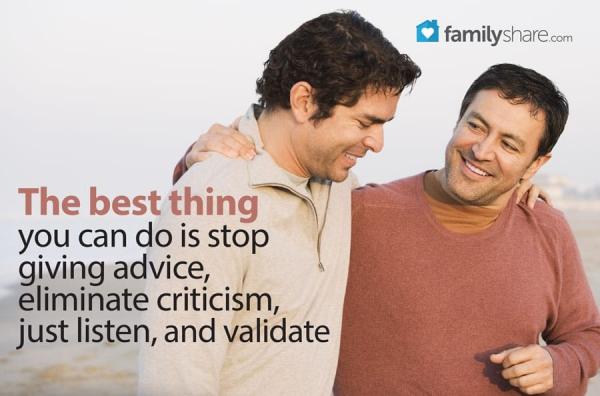
There is an almost magical formula for listening to your loved ones and responding in a way that they feel cared about and understood. The best thing you can do is stop giving advice, eliminate criticism, just listen, and validate.
The meaning of validation
Validation in this context means: walking emotionally beside another person without trying to change his or her direction.
To understand this concept, picture yourself walking beside your spouse. At some point, she starts to share a problem or concern with you. You think it's your job to solve her problem so you begin telling her what she should do - giving advice. When that happens it's like you have moved from walking beside her to jumping in front of her. The walking beside has ceased and now it's a confrontation.
Keep in mind, you don't have all the answers. If you think you know what the answer is, just bite your tongue and be quiet for now. Keep on listening, using an occasional validating phrase such as, "Oh," "Wow!", "I'll bet that's hard.", "That would hurt.", and "I'm so sorry that happened to you."
It's time to stop thinking you have to make everything all better. You don't even have the power. That power lies within the person with the problem. As people are listened to and validated they can more clearly determine what they need to do.
These four rules of validation will help in the process of listening with your heart.
Rule #1 LISTEN: Listen by giving your full attention
. Look at the person, not a TV, computer, or anything else. Stop what you are doing and give yourself over to the one who needs your listening ear. Zip your lip, look at them, open your ears, and your heart.
Rule #2 LISTEN: Listen to the feelings being expressed
Let them feel what they are feeling. You can't talk them out of what they are feeling. When someone says, "You shouldn't feel that way", it intensifies their frustration or anger. If you just listen and let them express how they're feeling, it will do wonders in helping them be rid of those intense feelings. No one has the right to correct another person's feelings.
Rule #3 LISTEN: Listen to the needs being expressed
If your mind is going into "fix-it" mode then your listening stops and you may never really hear what that person's needs are. One woman's husband was continually telling her what to do when all she wanted to do was have him listen to her frustrations. She finally figured out that she needed to instruct him. She said, "Now I tell my husband, 'I need to talk. Don't try to solve anything. I just need you to listen"'. It worked.
When people have a chance to express their needs, uninterrupted, then that gives their mind a chance to focus and come up with their own solutions.
Rule #4 UNDERSTAND: Put yourself in the other person's shoes the best you can
You aren't that person and you can't know what he or she is going through unless you try to see from his or her perspective, not yours. Instead of saying, "I understand what you're going through," you might say, "Please help me understand better." You don't have to agree, just work at understanding. That's genuine listening.
If you follow this process and listen with your heart many problems will be avoided and feelings of love will abound. That's what creates happy marriages, happy homes, and happy relationships.
[More about these concepts and their application can be found in the Lundbergs' book "I Don't Have to Make Everything All Better."� Published by Penguin, Available at amazon.com and http://www.garyjoylundberg.com/.]

